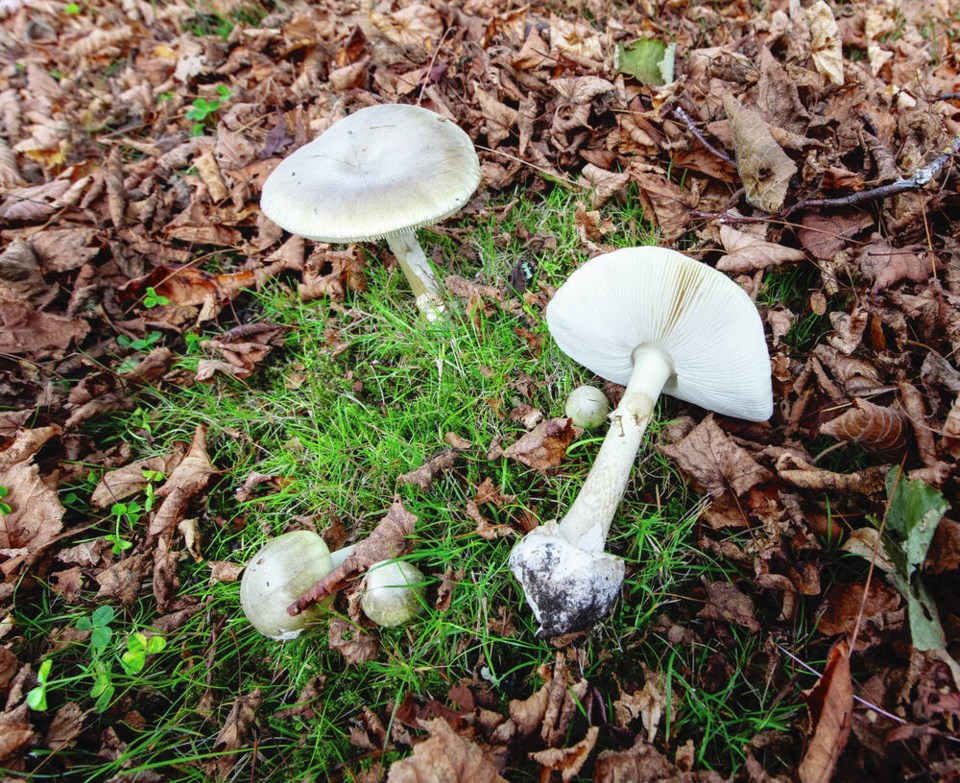The District of Oak Bay is advising the public to be aware of death cap mushrooms that typically show up in the municipality at this time of the year.
The mushrooms are extremely toxic and can cause severe illness and may be lethal if ingested by people, especially children, as well as pets.
While the municipality has not received any reports of sightings, it proactively issues a warning at this time of the year to warn the public.
“While they are more commonly found in August, we have begun to see them earlier each year, leading to us to issue the warning at the end of June,” said Chris Hyde-Lay, manager of parks services for the municipality.
Death cap mushrooms, which are classified as an invasive species, can be identified by their pale and yellowish colour, large cap and skirting underneath.
While extended periods of drought can take a heavy toll on fruiting mushrooms, the deadliest of them all can appear any time of year because they are being watered regularly, said Metchosin mycologist Andy MacKinnon.
Death caps, Amanita phalloides, live off host trees and are commonly found on city boulevards and lawns, and in parks throughout the capital region — places where they’re most likely to be aided by human watering. Late summer and autumn rains typically feed other species.
“Oak Bay may be the death cap capital of Canada,” said MacKinnon, noting the large numbers of gardens, ornamental trees and Garry oaks in the municipality that are being watered.
The deadly mushroom found its way to Greater Victoria attached to the roots of ornamental European hardwoods that were imported about 50 years ago and has typically been seen around English oaks, chestnuts, lindens and hornbeams planted on boulevards, around homes and in parks.
But it has since adapted to be hosted by pines and Garry oaks, with some of the first found near Camosun’s Interurban campus.
Threads of the fungi travel underground via complex and intertwining root systems, while spores travel through the air. The spread of the death cap in Greater Victoria and as far north as Galiano Island and Courtenay has prompted Island Health and municipalities to issue public warnings. The death cap is also spreading int the Lower Mainland with caps found as far east at Mission.
“It’s figured out how to grow in association with Garry oak and so we will see more of them,” said MacKinnon.
He said right now it’s far too dry for any mushrooms to fruit, so any mushrooms you’re seeing are being aided by regular watering or other moisture sources.
In 2016, a three-year-old Victoria boy died after eating a meal with death caps gathered from a Victoria boulevard, while in 2003, an Oak Bay resident barely survived after cooking and eating the poisonous mushrooms that he thought were puffballs. Several pets in the region have also been sickened.
Island Health has said up to 30 per cent of people who eat a death cap will die, and “liver transplants are a necessary life-saving procedure.” Early treatment in hospital is essential.
People are advised to use gloves when removing the mushrooms. MacKinnon said the death cap mushroom is highly poisonous, but people won’t get sick by brushing up against them. “You have to ingest them for the poison to have a [potentially lethal] effect,” he said, but added caution is always better.
Hyde-Lay said that the municipality will send out a work crew to remove the mushrooms if it is a prolific patch.
People are advised to discard the mushrooms in the garbage container. Do not compost or use the food recycle bin. Remove the mushrooms before mowing the lawn to avoid local spread.
If you suspect that you or someone in your family has consumed a death cap mushroom, call 911 or go to the nearest hospital. Keep a sample of the mushroom for testing.
To suppress early fruiting of death caps, avoid unnecessary lawn watering.
For more information, call the B.C. Drug and Poison Information Centre at 1-800-567-8911 or healthlinkbc.ca/health-topics/poisoning.
>>> To comment on this article, write a letter to the editor: [email protected]



